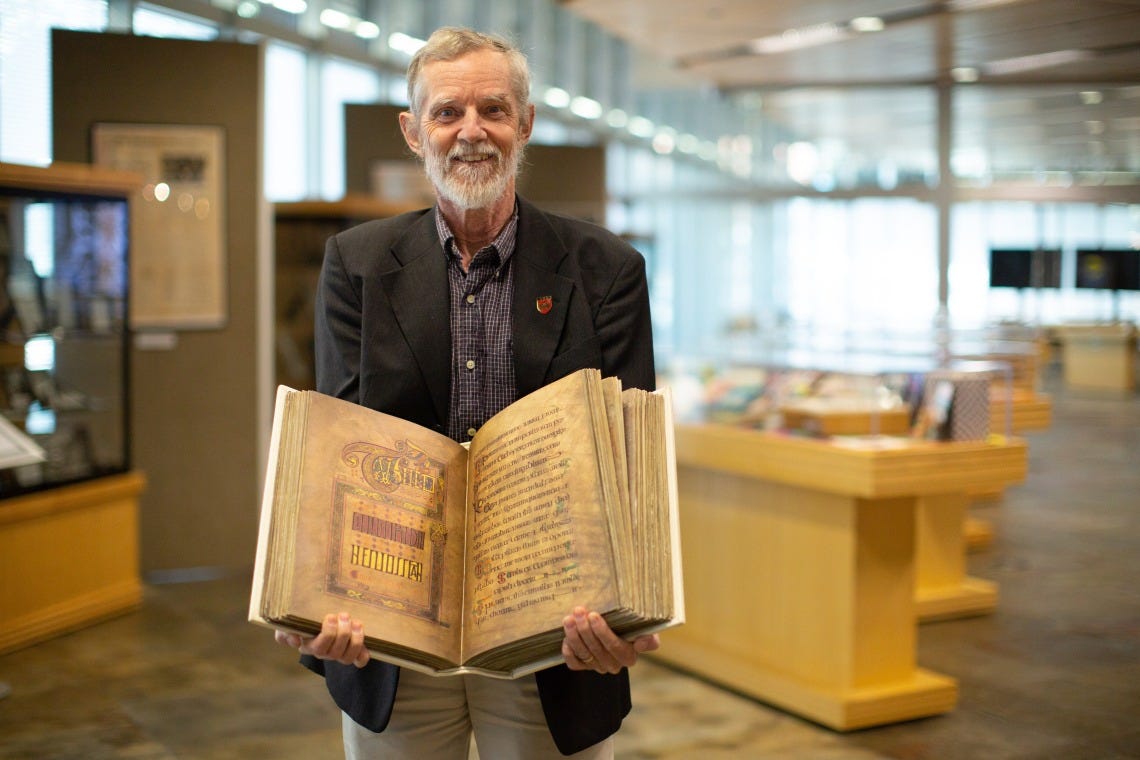🧠💡 From Knights to Keyboards: How Medieval Insights Solve Today's Problems
📚🏆 Academic Giant: Dr. Classen's Scholarly Achievements 🗝️🌈 The Seven C's: A Medieval Framework for Modern Harmony 🖥️⚔️ Social Media: The New Battlefield of Ideas
Based on the 9/16/24 Buckmaster Show on KVOI-1030AM.
⏮️ ICYMI: From the Last Show…
😽 Keepin’ It Simple Summary for Younger Readers
👧🏾✊🏾👦🏾
🏰👨🏫 Dr. Classen, a super smart teacher, studies really old stories from hundreds of years ago. He found out that these old stories have lots of important lessons for us today! 📚🔍 He teaches his students about love, being kind, and working together. These are things that can help make the world a better place, just like they did long ago. 🌍❤️ Dr. Classen also thinks it's super important to learn about different cultures and how to talk to people from all over the world. He even writes about how people used to think about animals back then, which helps us understand how to take care of nature now! 🐎🌳
🗝️ Takeaways
🤝 Medieval wisdom offers valuable insights for addressing modern societal issues
💖 Love and understanding are powerful antidotes to hatred and division
🧠 Humanities education is crucial for developing global citizens and combating hatred
🚫 Social media's unchecked nature poses risks to factual discourse and social harmony
🐕 Studying historical human-animal relationships provides context for current environmental discussions
📻 Radio Show Topics
🎓 Dr. Albrecht Classen: Illuminating the Present Through Medieval Wisdom
In an era marked by rapid technological advancement and societal polarization, Dr. Albrecht Classen, a distinguished professor of German Studies at the University of Arizona, offers a unique and invaluable perspective.
Drawing from his extensive knowledge of medieval history and literature, Dr. Classen provides insights that bridge centuries, demonstrating how lessons from the past can illuminate our path forward in addressing contemporary challenges.
💼 A Scholar of Remarkable Distinction
Dr. Classen's credentials are nothing short of extraordinary. He stands as a towering figure in academia with 130 scholarly books to his name, hundreds of articles and book reviews, and a dozen volumes of poetry.
His work has earned him numerous accolades, including the prestigious Grand Knight Commander of the Most Noble Order of the Three Lions, which recognizes his outstanding contributions to German studies. This vast body of work and recognition speaks to Dr. Classen's deep understanding of medieval culture and its relevance to modern society.
💖 Love: The Antidote to Modern Hatred
Dr. Classen emphasizes the timeless importance of love in a world often dominated by divisive rhetoric and polarizing ideologies.
He states, "I have always been very deeply interested in the topic of love because that was the most important topic in medieval quarterly culture."
This focus is not mere romanticism but a profound understanding of love's power to counter hatred and foster unity.
Dr. Classen's approach to teaching reflects this philosophy. He notes, "I do not notice any form of hatred. This is a very mixed group of people," when describing his current class of about 105 freshmen. This observation suggests that when given the opportunity and guidance, young people can transcend the divisions that often plague older generations.
🎭 The Seven C's: A Medieval-Inspired Framework for Modern Harmony
Dr. Classen introduces a concept he calls "the seven C's" in his teaching:
Communication
Commitment
Compromise
Coordination
Collaboration
Compassion
Courage and care
These principles, deeply rooted in medieval wisdom, offer a comprehensive framework for navigating complex social interactions and fostering understanding across diverse groups.
Dr. Classen observes, "They seem to accept that. It's a logical component. They are searching for something."
This search for meaning and guidance among young people highlights the enduring relevance of these timeless principles.
📚 Defending the Humanities in a STEM-Focused World
In an academic landscape increasingly dominated by STEM fields, humanities departments often face budget cuts and marginalization.
Dr. Classen ardently defends the crucial role of humanities education, arguing, "We are teaching our students in the basic, the essential components, how to communicate, how to understand other cultures, how to develop into global citizens, and thereby to combat hatred."
He further elaborates on the unique value of humanities education:
"We don't have laboratories or anything of that sort. But we are teaching our students in the really basic, the essential components, how to communicate, how to understand other cultures, how to develop into global citizens, and thereby to combat hatred."
This perspective challenges the notion that humanities are less valuable or practical than other fields of study.
🖥️ The Double-Edged Sword of Social Media
When asked about the role of social media in propagating hatred, Dr. Classen expresses deep concern:
"Everyone can spout forth anything he or she is thinking without any control, any fact-checking. I mean, this is just bonkers nowadays."
This observation underscores the urgent need for critical thinking skills and media literacy in our digital age.
Dr. Classen's critique of social media highlights a paradox of our times. While we have unprecedented access to information and global communication, these same tools can be used to spread misinformation and foster division. His perspective reminds us of the importance of thoughtful, fact-based discourse - a principle that was as relevant in medieval times as today.
🏰 Demystifying Monastic Life: Challenging Modern Misconceptions
Dr. Classen's upcoming talk on medieval monasteries aims to dispel misconceptions about monastic life.
He notes, "We think of the cloister in New York. And you assume that is the center of the monastery. Or it is a monastery. That's completely wrong."
This example illustrates how historical understanding can correct contemporary misinterpretations.
He further elaborates on the complexity of monastic life: "You could not simply enter a monastery. You had to go through a really long series of tough tests."
This insight challenges the romanticized notion of monasteries as simple refuges from the world, revealing them as complex institutions with rigorous standards and significant societal roles.
Dr. Classen also illuminates the economic aspects of monasteries: "A lot of older people who could no longer run their own estate said, OK, take care of us. And then, after our death, you take over our farm. So this was a very convenient system."
This historical context provides a fascinating parallel to modern discussions about wealth accumulation and social welfare systems.
🌍 Fostering Global Perspectives in Academia
As editor-in-chief of the international online journal Humanities, Dr. Classen promotes a global, interdisciplinary approach to scholarship. He celebrates the journal's diversity, stating, "We get a lot of submissions from China, India, and many different African countries. And we have the opportunity to develop new perspectives, whether it's gender issues or eco... We call it eco poetry or ecocriticism, using literary texts to explore our environment and what we can do about it, raising sensitivities and awareness."
This global approach to scholarship exemplifies Dr. Classen's commitment to fostering cross-cultural understanding and addressing global challenges through the humanities. It demonstrates how academic journals can serve as platforms for international dialogue and collaboration, bridging cultural and geographic divides.
🐕 Animals in Medieval Culture: A Window into Human-Nature Relationships
Interestingly, Dr. Classen also touches on the role of animals in medieval culture, particularly dogs.
He notes, "Either as pet dogs, or as hunting dogs, or as companions, or as mysteries that knew better, or knew the trail, and so forth, as warnings about the dangerous paths one could take."
This insight into human-animal relationships in medieval times offers a fascinating perspective on how our bonds with animals have evolved over centuries.
Dr. Classen's work in this area, including an upcoming conference focusing on horses, highlights the importance of understanding human-animal interactions throughout history. This research illuminates past societies and provides valuable context for contemporary discussions about animal rights, environmental stewardship, and the human relationship with nature.
🎓 The Enduring Relevance of Medieval Studies
Dr. Albrecht Classen's work exemplifies how studying history, particularly medieval history, can provide valuable insights into contemporary issues. By examining past societies' approaches to love, community, global understanding, and even human-animal relationships, we can gain fresh perspectives on addressing today's challenges of hatred, division, cultural misunderstanding, and environmental concerns.
His scholarship reminds us that while the specifics of our challenges may change over time, the fundamental aspects of human nature and society often remain surprisingly constant. By understanding how past societies grappled with community, faith, knowledge, and coexistence issues, we can better navigate our own complex world.
As we face unprecedented global challenges in the 21st century, voices like Dr. Classen's are crucial. They remind us that wisdom is timeless, that the past has much to teach us, and that the humanities are essential in fostering the critical thinking, empathy, and global perspective necessary to build a more harmonious and sustainable future.








